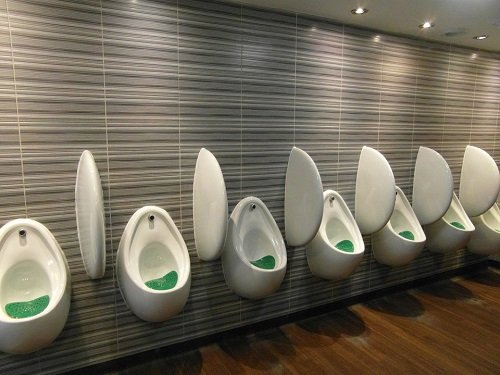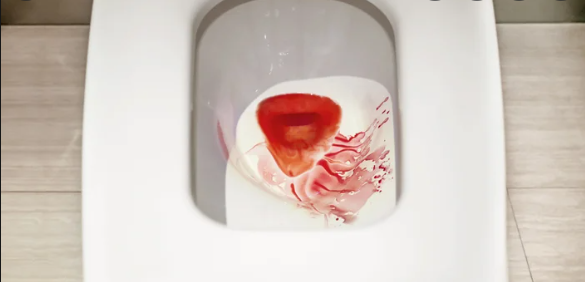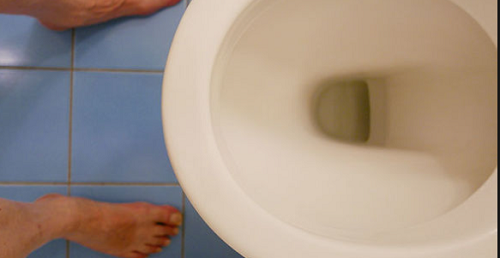Thicker urine usually contains more salt than regular water, making it naturally sink to the bottom of the toilet bowl. But it may also mean the urine contains more protein than normal. If your urine is high in sugar, it will be much denser, meaning that it would sink to thee bottom of the toilet bowl. Severely dehydrated people have much more dense, thicker urine because of all the salt in the urine, so it sinks.
Other factors such as dehydration, crystals in the urine, or dissolved salts (e.g., sodium) in the urine may also cause it to be denser. If you are dehydrated or have jaundice or blood in your urine, your urine will be darker. If this happens repeatedly or you have any other unusual symptoms, please visit the doctor. Urinary tract infections are dangerous, so don’t take chances if you notice urine sinking to the bottom of the toilet.
In the meantime, ask your doctor if you should drink a lot of water to rectify the situation. Avoid alcohol or booze beverages until you identify the cause. Eat healthy food, but try to keep it light until you discover why you have this problem.
Common Reasons Why Urine Sinks To Bottom Of Toilet
Urine with a high density may contain more salt than water and more protein. Very dehydrated people have highly concentrated urine. You may even find it harder to urinate because of high salt levels. Many people don’t even know what their urine looks like, but the color, the smell, and even the consistency of the urine can tell you quite a lot about your health.

What Different Urine Colors Indicate
The easiest way to tell if someone is dehydrated is by recognizing their urine color. Here are the different colors of urine and what they indicate about your health.
Clear white
Drinking too much water is not very healthy, but it could cause your body to lose some of its electrolytes. Clear, white urine may also indicate problems with your liver, like cirrhosis or viral hepatitis. If you are not drinking too much water and have clear urine regularly, you should see your doctor.
Amber or honey color
It means you are not getting enough water to make your urine lighter. You are not diluting the urochrome pigment in your blood to make urine lighter. Not drinking plenty of water, especially if you sweat a lot during hot weather or exercise, could cause you to become dehydrated.
Orange
Some medications can cause your urine to become orange in color, but if you are not drinking any medicines, you might be dehydrated and need to get up to speed on how much water you drink. If you think you have enough water but your urine color is still orange, it is better to consult your doctor. You may have a problem with your liver or your bile ducts.
Pale yellow/yellowish
This is the typical color that most men use; the urochrome pigment is in our urine naturally and gets more diluted as we drink more water. Pale yellow urine is considered the best color because it indicates that you have had enough water throughout the day.
Dark yellow
This is still considered a standard color for urine, but it is possible to get even more fluid by drinking plenty of water daily. You are not severely dehydrated, but you are getting quite dehydrated. If you have a lot of B-vitamins in your system, your urine may have a bright yellow color, like in a neon sign.
Blue or Green
Certain medications can cause your kidneys or bladder to dye your urine. Pseudomonas aeruginosa is a bacterium that can cause your urine to turn green, blue, or even indigo purple. You may need an antibiotic to get rid of the bacteria. Always consult your doctor if you start to see a yellow or green urine color.
Dark orange or brown
It could be that you are severely dehydrated and need to have it urgently addressed. It could also be an indication of severe liver disease or porphyria. Certain medications, including metronidazole, nitrofurantoin, and chloroquine, can also cause this color of urine.
Pink or red
Foods like beets and rhubarb can cause your urine to be pink or magenta, like when you have a kidney stone. Some health conditions can make blood appear in your urine; a condition called hematuria. Certain medications, including phenazopyridine and rifampin antibiotics, may also cause your urine to be pink or red.

How to Keep Yourself hydrated
If you notice that your urine is sinking to the bottom of your toilet bowl, that’s an indication that you are severely dehydrated. Here are a few ways to keep yourself hydrated and avoid such problems.
Drink Plenty of Water Whenever You Sweat
Drink plenty of water during and after exercise. Drinking sports drinks may help you stay active for longer than an hour. They contain electrolytes and carbohydrates that help your body produce more energy and help it absorb more water. There are many different sports drinks that contain calories and sugar, and many have high levels of sodium (salt).
Eat Lots of Fruits and Vegetables
You can get plenty of water from eating fruits and vegetables. Think about the juices you get from eating melons, zucchini, cabbage, strawberries, cucumbers, and tomatoes. You might be eating a healthy salad while rehydrating simultaneously. Moreover, fruits are more nutritious to eat as snacks or as a dessert.
Drink Adequate Water
It is still easiest to drink plain water, and it’s the cheapest way to stay hydrated. If you don’t like the taste of your water, you can change it by adding a few slices of lemon or cucumber to the water. Sufficient fluid intake is about 15.5 cups (3.7 liters) per day of fluids for men and 11.5 cups (2.7 liters) for women.
Limit Alcohol and Caffeine Intake
You can still get your fill of water by drinking coffee, tea, or other strong drinks. It is best to limit your caffeine intake because it can cause you to urinate more frequently or feel anxious or jittery; it may also cause you to consume more calories because some choices are high in sugar.
Drink Depending On the Weather
Do not forget that the weather affects how we drink water. If you constantly sweat a lot, it is good to drink more water than you usually drink. Do not wait until you are thirsty before you drink your water. When you are already dehydrated, you will experience feelings of fatigue because of consuming more water than you usually do. Set some reminders to alert you that it is time to drink water, especially if it is hot.
Wrapping Up
It is best to monitor what your body does and how it reacts to certain things like diet and other habits if you want to prevent your dehydration from getting worse. You should not necessarily obsess over tiny details every day, but if you know your body well, it will be helpful to keep track of how things are going.
Do not hesitate to contact your healthcare provider if you are worried that something is wrong with your urine or if you are having other health problems.

Judy Battista is an interior designer who holds a bachelor’s degree in interior design from Cornell University — Ithaca, NY. Her passion for home improvement and interior design has contributed to her extensive knowledge of everything bathroom remodeling and general interior design. Judy often publishes home décor articles on several websites, including Sprucetoilets.com, Sprucebathroom.com, and Mybesuitedhome.com. She also contributes to various interior design magazines. As a skilled interior designer, Judy Battista is well versed in computer-aided design (CAD) and other technologies used in the interior design space.
